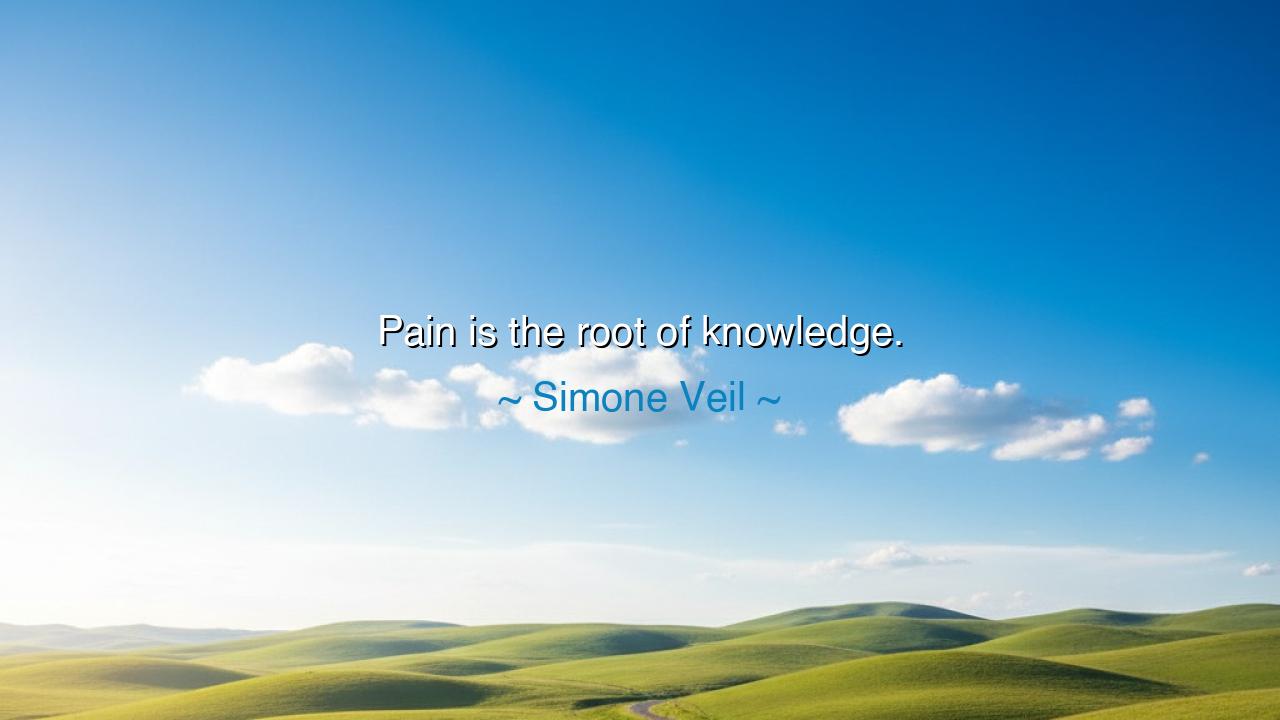
Pain is the root of knowledge.






Hear the solemn words of Simone Veil, survivor of horror, bearer of dignity, who declared: “Pain is the root of knowledge.” In this short yet thunderous phrase lies a truth that pierces deeper than comfort ever could: that wisdom does not sprout in ease, nor does true understanding arise from soft and gentle days. It is pain—the wounds of the body, the scars of the spirit, the struggles of the soul—that carves the vessel in which knowledge is poured. For suffering strips away illusion, humbles pride, and forces the heart to behold what is real.
The ancients, too, knew this mystery. In the tragedies of Greece, heroes did not gain wisdom through triumph, but through anguish. Oedipus learned truth only after despair blinded him. Prometheus brought fire to mankind, but his knowledge was born of chains and torment. Even the philosophers declared that to suffer is to be taught by necessity, for hardship is the sternest teacher. Thus does Veil, shaped by the furnaces of her own time, give voice to the timeless truth: knowledge has its root in pain.
Consider Veil’s own life. As a child she was cast into the inferno of Auschwitz, where death and cruelty reigned. She emerged scarred yet unbroken, carrying within her the bitter knowledge of what humanity can inflict—and also of what it can endure. This experience, though unspeakably cruel, became the wellspring of her later strength. When she rose to become a stateswoman, a champion of women’s rights, and a defender of human dignity, it was not despite her suffering but because of it. Her knowledge of justice, of resilience, of compassion, was rooted in pain. Without those trials, her voice would not have carried the same unshakable authority.
History itself affirms this. Nations often learn more in the aftermath of war than in times of peace. Individuals who stumble through loss often emerge wiser than those who have only tasted success. Abraham Lincoln, scarred by personal grief and the agony of civil war, spoke with a depth of mercy and clarity that prosperity alone could never have taught. His greatness, like Veil’s, was planted in soil watered by tears. Such is the harsh paradox of life: pain awakens truths that joy alone cannot reveal.
But we must be careful to understand. Veil does not glorify suffering for its own sake; she does not call us to seek torment. Rather, she teaches that when pain arrives—as it surely will—it must not be wasted. It can be the root of bitterness, or it can be the root of knowledge. The choice lies in whether we allow hardship to break us into despair, or to break us open to truth. Those who endure with reflection and courage find wisdom blooming where only sorrow once dwelled.
The lesson is clear: when suffering comes, do not curse it alone, but ask also what it teaches. In heartbreak, one may learn the depth of love. In failure, one may learn the strength of perseverance. In oppression, one may learn the value of freedom. Thus, every wound, though cruel, may carry within it a hidden seed of wisdom. It is in the soil of sorrow that the tree of knowledge takes root.
Practical action flows from this: when you suffer, seek to understand, not only to escape. When you see another in pain, recognize the wisdom they may be forging in silence, and treat them with reverence. And in your own life, carry forward the lessons of your struggles—not as burdens, but as gifts of insight, to guide others as they face their own storms.
So remember always the teaching of Simone Veil: pain is the root of knowledge. Do not flee it in shame, nor waste it in despair. Let it deepen you, let it sharpen your vision, let it teach you truths that no ease could ever reveal. For though pain may wound the flesh and scorch the soul, from its roots can grow the wisdom that endures, that heals, and that lights the path for generations yet to come.






AAdministratorAdministrator
Welcome, honored guests. Please leave a comment, we will respond soon